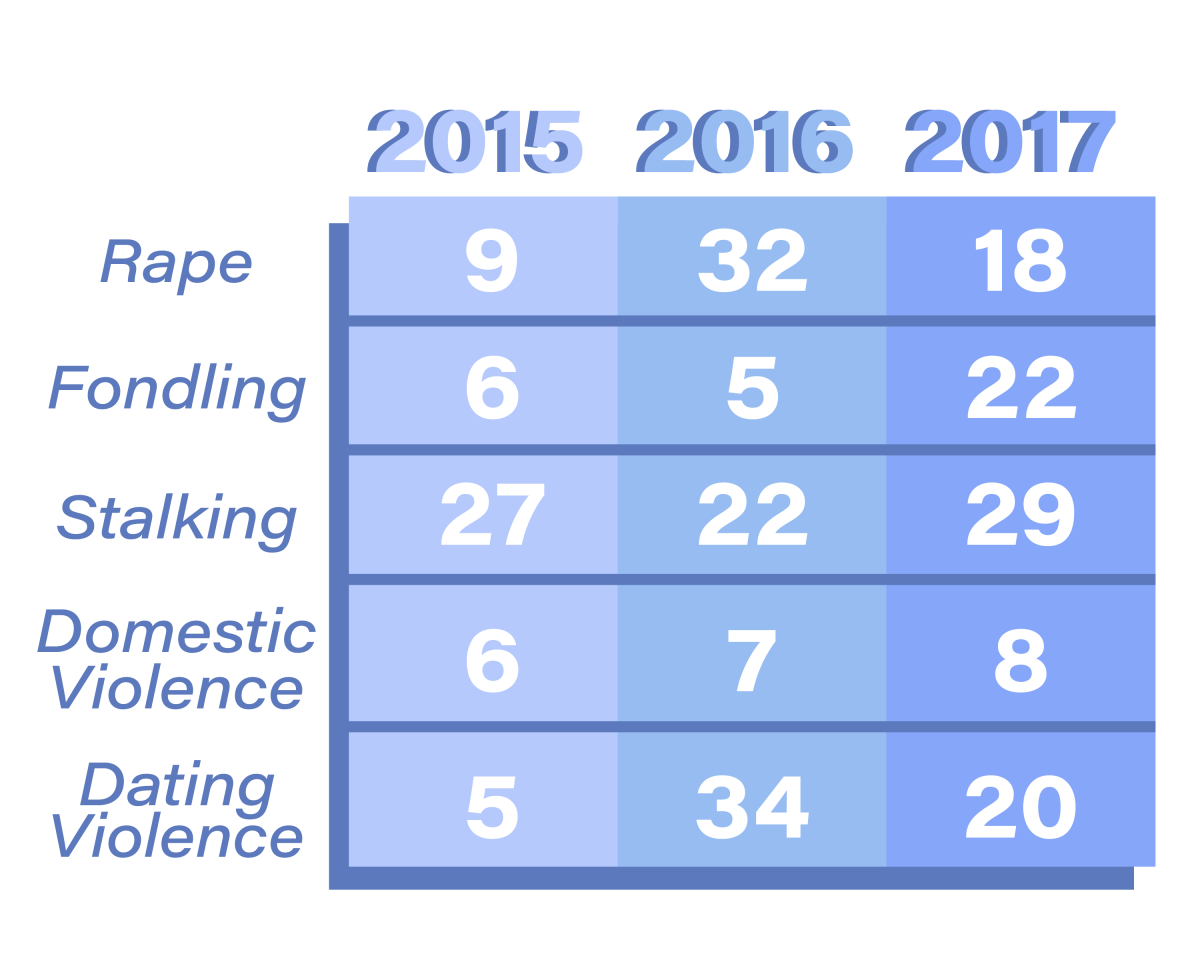More student survivors are reporting incidents of sexual assault on campus, giving campus community centers more data and ability to provide survivors with resources they may need during the reporting process.
The 2018 Security & Fire Safety Report, released in fall 2018, displays the 2017 crime and fire data that occurred on university property, with two preceding years as well.
Major Ian Kendrick, support services commander of the NC State University Police Department, explains what this data means in terms of sexual assault statistics, the general trend being an increase in number of incidents reported on campus.
Janine Kossen, associate director of the Women’s Center, said that sexual assault is the most underreported crime in the U.S. and in the greater community, less than 40 percent of sexual assault incidents are reported. On college campuses less than 10 percent are reported.
“It is really important to know that any type of interpersonal violence – rape, stalking, domestic violence, and dating violence – is vastly underreported, especially on college campuses,” Kossen said. “A lot of times, what people see when they are looking year-to-year is this jump, or increase, and they think that means campus is less safe. It is actually a good thing when the numbers go up because it means [survivors] trust the system, they feel safe coming forward, and they feel supported.”
Based on the Security & Fire Safety Report, incidents of rape went from 9 to 32 to 18, stalking from 27 to 22 to 29 and dating violence from 5 to 34 to 20 in the years 2015-17 respectively. In 2016, one individual reported being raped approximately 20 times by an individual with whom they were in a dating relationship, this being reflected as 20 separate incidences in the 2016 rape and dating violence statistics due to the Clery Act.
“The Women’s Center, from our data, we have just last semester had more cases of students coming to us than all of the previous academic year,” Kossen said. “A lot of that is a direct result of the larger culture. Last year, October/November was a huge peak for us with the Women’s Center, which correlated with the beginning of the #MeToo movement.”
Many survivors still face barriers coming forward, ranging from victim-blaming to simply not knowing how to do so. Kossen said that trend analysis from the Women’s Center over the past three years showed that counseling support and academic accommodations have been the two most requested resources among survivors who reach out to the Women’s Center.
“You can go to places like the Women’s Center to report, you can report to your RA if you live in a residence hall, you can report to someone at the [GLBT] Center,” Kendrick said. “What we are interested in is survivors getting the information to someone they trust, whether they want to prosecute or not, or whether they want the police to get involved or not, the first step is getting the information to someone they trust. Ultimately that will start leading into being connected with resources: getting assistance for the trauma, getting medical assistance perhaps, counseling, you name it, but that is the first step.”
Kendrick said that survivors who choose to speak to a Campus Security Authority, which is typically a trained professor or resident advisor, may remain anonymous in that Authority’s report to campus police.
“If a survivor wants the police involved, great,” Kendrick said. “We will absolutely sit down and open the investigation. Through the investigation, the survivor still has the option to prosecute the case. If they don’t prosecute, no problem, but we always have the option from the university to send someone to Student Conduct.”
Kendrick said that while statistically it is more likely that a survivor is not interested in prosecuting, he would ideally like to see every survivor prosecute a case in order to remove offenders from campus.
“The key is to report it,” Kendrick said. “Go to somebody you trust and are comfortable talking to, and just start the process of talking about it and getting connected to resources.”
If a student is experiencing relationship violence, sexual violence or stalking, and is in need of advocacy services, the Women’s Center has advocates available from 8 a.m.-5 p.m. Monday-Friday in room 5210 of Talley Student Union. After-hours, students can call the 24/7 Sexual Assault Helpline at 919-515-4444 to be connected with an advocate.
Students can visit Safe at State online for a complete list of resources and contact information.













